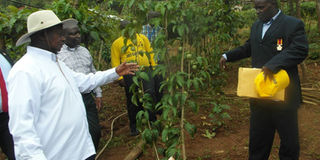How mixed cropping turned the fortunes of a Kabale teacher

Charles Rutaro (right) conducts President Museveni around his fruit garden in Kabale District recently. Photo by Robert Muhereza
What you need to know:
- Charles Rutaro annually earns Shs43m from mixed cropping. This is more than seven times what his teaching job fetches him, writes Robert Muhereza
Charles Rutaro annually earns Shs43m from mixed cropping. This is more than seven times what his teaching job fetches him.
Charles Rutaro believes that you cannot put all your eggs in one basket. It is the reason that the secondary school teacher supplements his government salary with mixed farming.
The resident of Kyerero Kandago village, Bukinda Sub-county Kabale District does not regret picking up the hoe because farming has given him more opportunities than what teaching could ever do.
President Museveni has visited his home twice because of his modern farming methods. And that is not all, Rutaro has benefitted from presidential donations.
In 2008, having been selected as one of the model farmers in Kabale District, Rutaro hosted the President at his home where his apple garden is located. The President donated to him a solar powered water pump worth Shs60m to help him start irrigating his crops since drought was a major challenge.
Recently, President Museveni visited Rutaro’s apple garden again and donated a pick-up truck after appreciating the innovations and developments. The original apple fruit garden has now been turned into a mixed fruit garden for apples, tomatoes, tree tomatoes, passion fruits with cabbages and other vegetables grown in the middle and at the garden boundaries.
Rutaro, who started with tomato growing, now earns Shs43m annually from mixed cropping on top of his annual salary as a secondary school teacher that is Shs5.52m.
“I started with tomato growing in 1986, after graduation from college, up to 2002 when I started apple growing. In 2003, I established fish farming ponds and in 2015 I went into tree tomato growing, passion fruits, tomatoes, tea, and selling apple, passion fruit and tree tomato seedlings.”
He says with the new irrigation system in place, he has minimised making losses. “I used to pump water for irrigation. Now I am able to earn more using the irrigation technology that allows me to keep harvesting throughout the year.”
Achievements
Rutaro is married to a primary school teacher and they have seven children. He says he spends Shs18.5m on school fees.
“If it was not for agriculture farming, I would not have managed to take my children to good schools,” he says. He has also bought different chunks of land in Ntungamo District where he is planting coffee and Matooke. “I have created jobs for the community as I have four permanent workers and five casual ones per week on my fruit garden,” he shares.
The irrigation scheme fruit garden supplies clean water to the communities around. He has also used profits from this project to construct a permanent house as well as a commercial house that has three business rooms that he rents out to get more monthly incomes.
Rutaro told President Museveni that transport is one of the challenges he faces while doing work at his farm, especially transporting mulching materials and organic manure.
His side
“Farmers need irrigation system so that they can produce enough food crops for domestic consumption as well as sale. Farmers need interest friendly financial institutions for loans and agriculture insurance if they are to succeed in commercial agriculture,” Rutaro adds.




